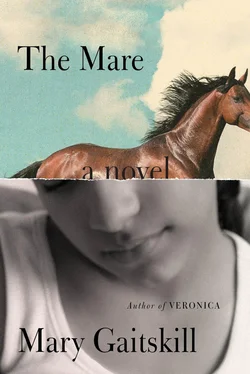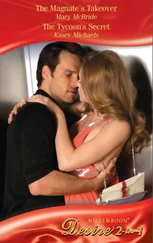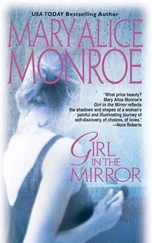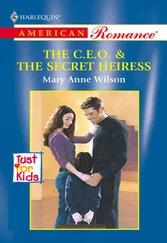Beverly wasn’t there, but Estella was. She said good morning to Pat and nodded her nose at me. Pat positioned the trailer outside the barn door and I helped her put out a ramp for the horse to walk up. Estella stood and lit a cigarette, smoking with flat eyes, thin lips wrinkled.
Pat went into the barn first and got a small whip that was different from a crop. “You’re gonna lead her, and if she doesn’t go up the ramp, I’ll tap her with this. Don’t worry, I won’t hit, just tap. Only if I need to. Maybe she’ll go without it. Estella will be on her other side just in case.”
Fiery Girl came out with her head up and ears forward; when she saw the trailer, her neck got stiff and she pulled on the chain. I put my hand on her neck; there was something in her I hadn’t felt before, something little and hurt, too hurt to be bad. I tried to find it with my hand, and talked to it soft. “Just come with me,” I said, “like before.” She listened; she put her head down to study the ramp and snorted at it like she recognized it and did not like it. It was almost funny — then I remembered the little girl. The girl she loved brought her to a trailer and she thought she was going home and — that was the hurt. Right then the mare shied off to the side, pulling me off balance.
Estella put her cigarette in her mouth and held her arms out, blocking the mare. Fiery Girl turned back to the ramp, but crouched and tensed in her legs. I got my balance back and tried to lead. She moved away from the ramp again. Estella held out her arms and Pat clucked with her tongue, then she must’ve tapped with the whip because the mare whinnied and started forward. I relaxed my lead arm and fixed my eyes on the trailer. Her head went up and I felt her mind on me, but she didn’t follow me. I told her it was safe. She looked to be sure I meant it, then calmed, her eyes deciding to trust me. “Good girl,” I said. “Good, beautiful.” Pat said, “That’s right.” Head high, the horse looked at the ramp again. I touched her neck. She relaxed and dropped her head a little. I rubbed her neck like I’d rub my mom’s legs. I got onto the ramp. So did she. Then it was like she took a deep breath and banged up it with high, wild feet.
Estella looked at me fully then, and not like I was a little girl that she had to lift up. She took her cigarette out of her mouth and said, “Good job.”
We took her to a party that night, to celebrate bringing the horse to Pat’s. It was a faculty party and normally those are terrible, but this was supposed to be for kids. There was going to be music, and Velvet wanted to go.
When we entered, the room was full of music and laughter, but the first people we saw were Becca and her editor friend, Joan. They greeted Paul, not me. My attention was pulled away by singing; in the corner, a young professor’s wife was playing a guitar while a tiny, charming child sang a pop song for a circle of children. Joan was saying, “I hear you ride horses. You should come to the barn where my daughter rides.” Velvet looked down, maybe confused by the friendly unfriendliness. Oblivious, Joan continued, “Edie could bring you over sometime. Would you like that?” and Velvet said, “Yea-uh,” with a tinge of mockery only I heard. Becca’s face softened on the girl like she was actually about to speak when there was a burst of energy and a gang of kids ran around us like happy water, pushing us a little apart. They were all younger than Velvet, much younger, with quick, animated faces, confident that they belonged and were loved above all, and they flashed around Velvet like she was a rock while right in front of me she became one. My heart sank. A writing teacher I was actually friendly with started talking to me, her smiling eyes on Velvet, trying to get a smile back. Joan touched my shoulder and said, “Let’s talk about it”; Becca turned away and Joan floated after her. Paul saw someone and abruptly excused himself; Velvet’s eyes followed him. “Let’s get some food,” said the teacher, and we did, but Velvet’s face disturbed me; her expression reminded me of her mother when I first met her in the Fresh Air Fund office, sitting in her body like it was a tank. We loaded our plates and sat down with a beautiful dance instructor who seemed to be friends with the writer. I listened while they talked, and Velvet sat silently beside me, her attention elsewhere. In another part of the room, a man was somehow playing a classical song on a garden hose. Children were laughing with delight. I followed Velvet’s eyes and saw she was looking at Paul, who was talking to a woman with red hair. I hadn’t seen her before. She looked old to be a student; was she a new instructor? The writing teacher was saying: “My kids are taking synchronized swimming and ballet and tap while all the other kids are taking soccer and basketball. Laurel so excels in swimming that it affects everything else she does, and the ballet, that has given her body a special awareness as a swimmer—”
“Yes, that body awareness, it’s part of everything,” said the beautiful dancer. “It translates into every single aspect—”
It was lovely conversation; its loveliness was so shaped and perfect that I could not touch it. Probably there was soft feeling inside, but the outward expression was so shaped and perfect that I could not feel it. It was so shaped and perfect that it hurt, and I thought I must be very ugly to be hurt by something so lovely. I wondered what Velvet felt. Did it hurt her too? She was standing there like her mother: alone in her tank, looking like a fighter when there is no fight — or at least no fight she could understand.
“She has really blossomed in tap, the way she moves! It is so different from ballet, she’s so serious in ballet! In tap it’s like she becomes a runway model; she vogues ! It’s dazzling, her personality comes out in such an inventive way!”
“Velvet rides,” I said. “She handles a very difficult horse that nobody else can manage.”
“Oh!” said the dance instructor. “So then you know what we mean about body awareness!”
Willed goodness showed in every muscle of the woman’s smiling face. Velvet looked at her and said nothing. I looked for Paul. I did not see him or the woman he’d been talking to.
“How has riding affected the other parts of your life?” said the dancer.
Velvet dropped her eyes. “Ahh dunno.” Her words said, I’m too stupid to say; her tone said, Your question is too stupid to answer.
I looked for Paul again and still did not see him. Or the redhead.
On the day after the party, Ginger and Paul took me to the county fair. It was so hot the air was fat and you could smell everything, not just the people and the food but the greasy machines that made the rides go. Paul’s forehead looked like one thick wrinkle melting into the other and Ginger was sweating herself practically invisible. People were still eating warm food and ice cream that dripped down them, and throwing balls or shooting plastic guns to win toys. There was this one guy shooting at worn-out green balloons; I even remember his hot eyes and purple pimples and his shirt wet under his arms, the way he glared through his sweat and shot like he was in hell and had to do it forever. We were there to see girls racing horses around barrels and boys on bulls, but I just kept thinking about Paul standing with that red-haired woman and then they went down a hall and I didn’t see them no more.
People were waiting for the barrel race on bleachers, eating and talking while music played like teeth biting at the air. Paul and Ginger sat like they were drawn in pencil; the other people on the bleachers ate and yelled and moved like they were drawn with big pens and colored in. The night before, when we got home, I expected to hear fighting — I even listened for it. But there was nothin’. I didn’t get it; Ginger had to see him with her. Then a fat-assed silky voice came on the loudspeaker to make us stand up and say the Pledge of Allegiance and sing that song nobody knows and then shit happened: The bulls in deep pens banged around and this boy I’m sure was Mexican straddled the wall and looked up at the crowd like he wanted somebody to look back at him. Music came on, that song with stamping feet: “We Will Rock You.” People shouted and a bull ran out with a boy on it, one arm holding, the other waving, the bull’s head down, its legs mad-dancing its back up into a fist that right away punched the boy on the ground, running for the fence as soon as he hit, the bull chasing, but not really, it was like they were friends, clowns came out and pretended to bother the bull, and the bull pretended to care. The fat-ass speaker voice said these brave riders could take a cash prize back to their families in Mexico or Texas, but when the Mexican boy came playing sharp-dressed man, and he stayed on longer than anybody, they said he couldn’t win the prize even though he didn’t even get punched off, he jumped off and grabbed the fence.
Читать дальше












